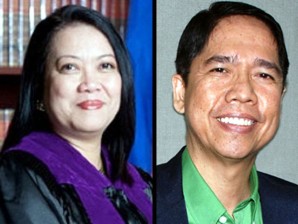
Associate Justice Lourdes Sereno and Comelec Commissioner Rene Sarmiento. FILE PHOTO
MANILA, Philippines – Nine of the 22 candidates for chief justice presented themselves before the Integrated Bar of the Philippines on Friday, promising to either “uphold the truth”, promote an “ethical, moral and independent judiciary”, or “reform the law licensure exams system”.
Of the nine, however, only four or five “satisfied”, said Roan Libarios, IBP national president, as “some failed to effectively address the concerns and issues of the legal profession.”
Those who participated in the IBP forum were Supreme Court Associate Justices Maria Lourdes Sereno and Roberto Abad, Commission on Election commissioner Rene Sarmiento, Presidential Commission on Good Government Chairman Andres Bautista, former law dean of the University of the Philippines Raul Pangalangan, University of the East Law Dean Amado Valdez, and lawyers Rafael Morales, Vicente Velasquez, Manuel DJ Siayngco Jr.
Libarios said the forum was meant “to strengthen public discussion on the search process for the next Chief Justice,” and to be used as additional reference by Judicial and Bar Council when it starts its selection process for the Supreme Court’s top post, which was vacated following the conviction of then incumbent Renato Corona by the Senate, acting as an impeachment court.
“We will make a summary of the proceedings and then submit to JBC for their evaluation as additional reference material,” he said, adding that IBP is contemplating on coming up with their own shortlist of nominees.
In her 30-minute speech at the IBP Building in Pasig City, Sereno vowed “to uphold the truth . . . in favour for those who are weak in order that justice, in its true sense, may be rendered.”
She also said that nobody, not even her husband, gained anything from her appointment by President Benigno Aquino III in 2010.
She reiterated that she was appointed based on her capabilities and what Aquino believed she could do for justice and the judiciary.
“Prior to my swearing, I only met him [Aquino] twice, in 2008 . . . and in 2010,” she said, adding that she didn’t have a political affiliation to rely on and was not even a media figure.
“I shall continue to be the people’s steward of justice, resolving disputes with an even hand ad an eye towards re-establishing faith in the rules of law,” said the valedictorian of the UP Law School, adding: “I vote what I think, I say what I mean, and I mean what I say.”
For his part, Sarmiento said he envisioned a judiciary that was “ethical, and moral, independent and transparent, and committed to the promotion of common good.”
Sarmiento said he wanted to enhance communication with the public, through a monthly or quarterly “Steps-of-the-Supreme Court chat” with the media, and also connect with government institutions and non-government organizations that seek to enable and empower the vulnerable.
Sarmiento said he was also looking forward to “enhancing international networking with foreign judicial bodies and organizations in the view of exchanging knowledge on legal practices with that of other nations and foundations”.
Meanwhile, Velasquez said he would establish a jury trial as “alternative” when in doubt of the impartiality of a judge on a particular case.
Pangalangan said he wanted to reform the law licensure exams system by giving a well-defined scope of the examination, where only one book is to be studied.